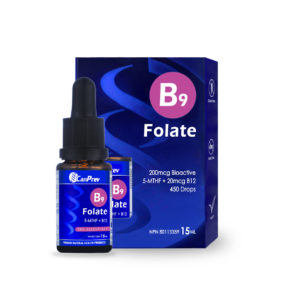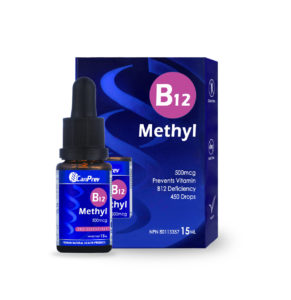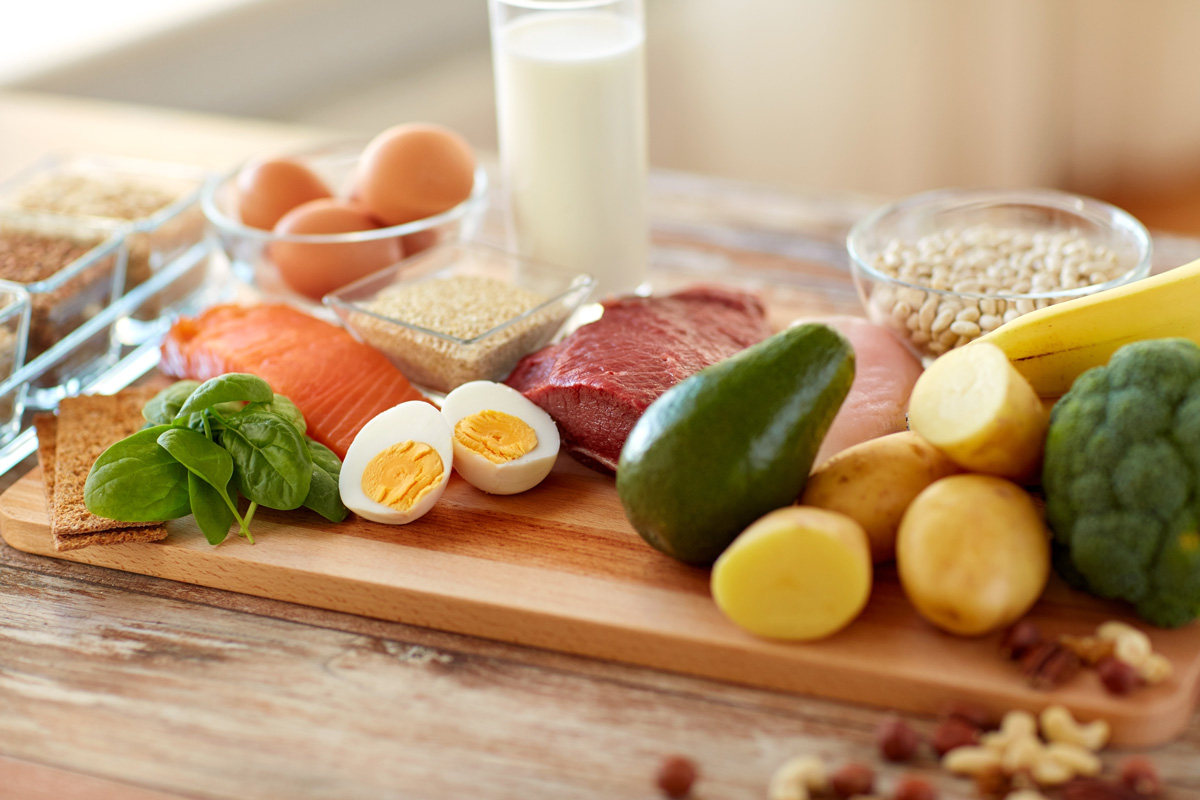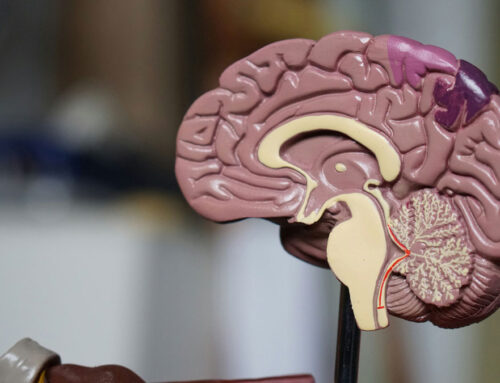The B vitamins are a family that often appear naturally combined in the foods we eat. They’re commonly known as the B family, or B complex. They work in conjunction with one another for critical metabolic functions, acting as assistant coenzymes to catalyze many chemical reactions involved with nutrient breakdown, cellular energy production, and more.
Signs & symptoms of deficiency in B vitamins
Believe it or not, some B vitamins are created by beneficial bacteria in the small and large intestines. But since they are water soluble and not retained in large quantities in the body, deficiency in one or many is common. This is especially true in times of stress, malnutrition, nutrient depletion, or antibiotic use.
Since the B complex works across thousands of biochemical processes, deficiency symptoms can be wide ranging. The most common signs that one or more B vitamins are lacking include:
- Fatigue
- Insomnia
- Loss of appetite
- Irritability
- Depression
- Nervousness
The vitamin B breakdown
Each of the B vitamins takes part in a huge array of biological functions. Below are some notable characteristics of each:
B1 – Thiamine
Thiamine is needed for cellular energy production, playing an important role in metabolizing glucose and converting it to fat for storage. It’s also used to synthesize acetylcholine, a major neurotransmitter used both for memory and learning as well as signalling muscles to flex.
Food sources: Whole grains, molasses, spinach, cauliflower, legumes
B2 – Riboflavin
Riboflavin plays a key role in forming adenosine triphosphate (ATP), the body’s main energy molecule. It helps cellular respiration, allowing cells to use oxygen more efficiently. Additionally, riboflavin encourages recycling of glutathione, the body’s most important endogenous antioxidant and a potent detoxifier.
Food sources: Beef liver, mackerel, herring, nori, asparagus
B3 – Niacin
This B vitamin encourages circulation and is famous at high doses for causing a hot, blushing feeling in the face called a histamine ‘flush’. Niacin is a pivotal coenzyme for red blood cell and steroid hormone formation, and is heavily involved in the breakdown of fats, carbohydrates, and proteins for energy. Healthy brain and nervous system function both depend on niacin.
Food sources: Beef liver, poultry, peanuts, tuna, salmon
B5 – Pantothenic Acid
From the Greek word, pantos meaning everywhere, vitamin B5 is found in every cell. It’s thought of as the stress-reducing B vitamin because pantothenic acid supports the adrenal glands in producing cortisol and other stress hormones like epinephrine (adrenaline) and norepinephrine. It assists with cellular energy production and acetylcholine production as well.
Food sources: Organ meats, egg yolks, fish, chicken beans
B6 – Pyridoxine
In its active coenzyme form, B6 is very important for the formation of neurotransmitters like serotonin, dopamine, and the ‘chill-out’ molecule GABA. It therefore has a strong association with mood balance. Pyridoxine also supports immune function, hormonal balance, the electric signalling of the nervous system, protein metabolism, and much more.
Food sources: Liver, whole grains, egg yolk, fish, poultry
B7 – Biotin
Biotin regulates fat metabolism, fatty acid synthesis, and amino acid combination. For this reason, biotin is highly associated with healthy hair, skin and nails – all sites of the body that see constant regeneration and extremely high cellular turnover. Biotin even helps form DNA!
Food sources: Liver, egg yolk, brewer’s yeast, almonds. Lactobacillus bacteria, commonly found in fermented foods, also produce biotin.
B9 – Folate
The name folate comes from the Latin word for foliage, owing to the dark leafy vegetables that boast large amounts of this particular B vitamin. Folate works with vitamins B12 and C to form red blood cells and transport iron.
Since it’s involved in DNA synthesis and cell division, it’s no surprise that folate has a key importance during pregnancy. Prenatal multivitamins will therefore include higher amounts of it, where the superior formulations will not use synthetic folic acid (which requires conversion in the body before it can be used), but the biologically active L-5-methyltetrahydrofolate (L-5MTHF).
Food sources: Kale, spinach, asparagus, corn, chickpeas
B12 – Cobalamin
As the ‘energy’ B vitamin, cobalamin wards off fatigue by stimulating the conversion of carbohydrates, fats and proteins into combustible fuel. Vitamin B12 is critical for the health of the nervous system and red blood cell formation.
Food sources: Meat, seafood, egg yolks, yogurt, tempeh
The B vitamin extended family
Choline
As a lipotropic B that helps emulsify and transport fats, choline helps with liver detoxification by supporting bile flow. It is also crucial for making up the bulk of the neurotransmitter molecule acetylcholine.
Food sources: Lecithin, egg yolks, brewer’s yeast, organ meats
Inositol
Choline and inositol, the fat-loving Bs, work closely together to maintain healthy cell membranes. Inositol, sometimes known as Myo-Inositol or vitamin B8, promotes healthy skin and hair, and helps to balance hormones, blood sugar and mood.
Food sources: Whole grains, citrus fruits, liver, molasses
So you might be wondering…
What’s the difference between inactive and active forms of B vitamins? Why is active better?
Before they can be used in the body, B vitamins must be converted into their biologically active forms. For example, the inactive forms of B12 cyanocobalamin must be dismantled into components cyanide and cobalamin, before a methyl group is added to cobalamin to make the active methylcobalamin that our body can use.
Due to genetic factors, many people have difficulty with these conversions. Supplementing the Bs in their active form will make sure they can get right to work as intended, no matter what’s in our genes.
| B Vitamins | Inactive form | Active form |
| Vitamin B1 | Thiamine | Benfotiamine |
| Vitamin B2 | Riboflavin | Riboflavin-5-phosphate |
| Vitamin B5 | Pantothenic Acid | Calcium d-pantothenate |
| Vitamin B6 | Pyridoxine | Pyridoxal-5-phosphate |
| Vitamin B9 | Folic Acid | L-5-Methyltetrahydrofolate |
| Vitamin B12 | Cyanocobalamin | Methylcobalamin |
Do I need B vitamins?
Yes! They are essential for joyful moods, abundant energy, and overall wellness. The vitamin B family has particular importance for liver function and detox capabilities as well. Pregnant women, vegans and vegetarians, the elderly, and anyone under a great deal of stress may benefit even more from added B vitamins, and such individuals are typically great candidates for supplementation.
How do I make the most of my B vitamin supplements?
Since most B vitamins are water-soluble and used promptly by the body, taking them at regular intervals helps to maintain them in a stable supply. Many people feel noticeably more energized and less prone to fatigue when taking a good B complex. However, it’s best to avoid supplementing after late afternoon because these same stimulating qualities may affect sleep.
Is my B complex the cause of bright yellow urine?
Most likely! This is natural and simply signals that you have hit the limits of absorption. This also demonstrates the safety of supplementing B vitamins: our kidneys will happily let go of whatever we don’t need in the urine.
What should I look for in a B complex?
A good supplemental complex, whether in liquid or capsules, will feature appropriate proportions of all the B vitamins, including choline and inositol, in their active forms.







Good day,
I’m a senior female with Hypothyroidism, which is controlled with 60mg of Dessicated Thyroid taken daily. I purchased your Synergy B Complex with L-Theanine, but can’t find it on your official website to check it out. Can you please tell me why?
Thank you in advance,
Joan
PS: I purchase your Magnesium Bis-Glyconate for sleep, and I love it – no upset tummy troubles 🙂
Hi there, thank you for your question. You can find CanPrev’s Synergy B Complex with L-Theanine here: https://canprev.ca/products/synergy-b/ Hope this helps!